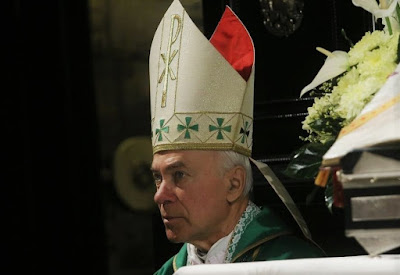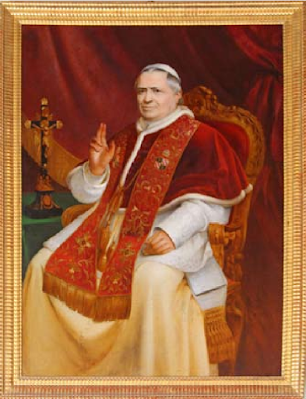The words "heresy" and "heretic" are thrown around quite a lot these days. We need to think carefully. Salvation is not based on what this or that person believes or says. Even if it be the Pope. No, my salvation and yours is based on believing AND acting in accordance with the Catholic Faith.
Heresy is the unseemly art of "picking and choosing" what dogmas and doctrines I (or you, dear friend) might wish to hold, rather than the entirety of the Catholic Faith without any dilution. St. Augustine wrote that to reject one point of doctrine meant the rejection of all doctrine.
Am I an heretic? Are you an heretic?
Do we pick and choose our favourite heresy that has the "icky" factor, is popular with our particular fan base, and "ham" it up, whilst glossing over our own heresies, pet ideologies?
The Catholic Faith is not for the faint hearted. Included in the Catholic Faith are the following propositions by Blessed Pius IX which cannot be rejected by Catholics without being at minimum suspect of propositio theologice erronea.
There are those who think that The Syllabus of Errors belonged to another less enlightened age, that now, we have progressed into a new age of "liberty". Modern man, of course recoils in revulsion that the Church dared pronounce against liberalism, against the concept of the modern, pagan (in truth gnostic) State that separates the Christian from the Citizen. Over 200 years of liberalism have brought the once Christian Nations to the verge of collapse. The Catholic Church, guided by the Holy Spirit, foresaw the disastrous consequences of the modern pagan State's attempt to dethrone Our Lord Jesus Christ. Thus it was that through Pius IX the Church pronounced authoritatively on various modern errors.
Have we been seduced, and ourselves are imbibing this poison?
So, let us test ourselves and discover if we are faithful Catholics.
15. Every man is free to embrace and profess that religion which,
guided by the light of reason, he shall consider true. — Allocution
“Maxima quidem,” June 9, 1862; Damnatio “Multiplices inter,” June 10,
1851.
55. The Church ought to be separated from the State, and the State from
the Church. — Allocution “Acerbissimum,” Sept. 27, 1852.
77. In the present day it is no longer expedient that the Catholic
religion should be held as the only religion of the State, to the
exclusion of all other forms of worship. — Allocution “Nemo vestrum,”
July 26, 1855.
78. Hence it has been wisely decided by law, in some Catholic
countries, that persons coming to reside therein shall enjoy the public
exercise of their own peculiar worship. — Allocution “Acerbissimum,”
Sept. 27, 1852.
79. Moreover, it is false that the civil liberty of every form of
worship, and the full power, given to all, of overtly and publicly
manifesting any opinions whatsoever and thoughts, conduce more easily to
corrupt the morals and minds of the people, and to propagate the pest
of indifferentism. — Allocution “Nunquam fore,” Dec. 15, 1856.

















